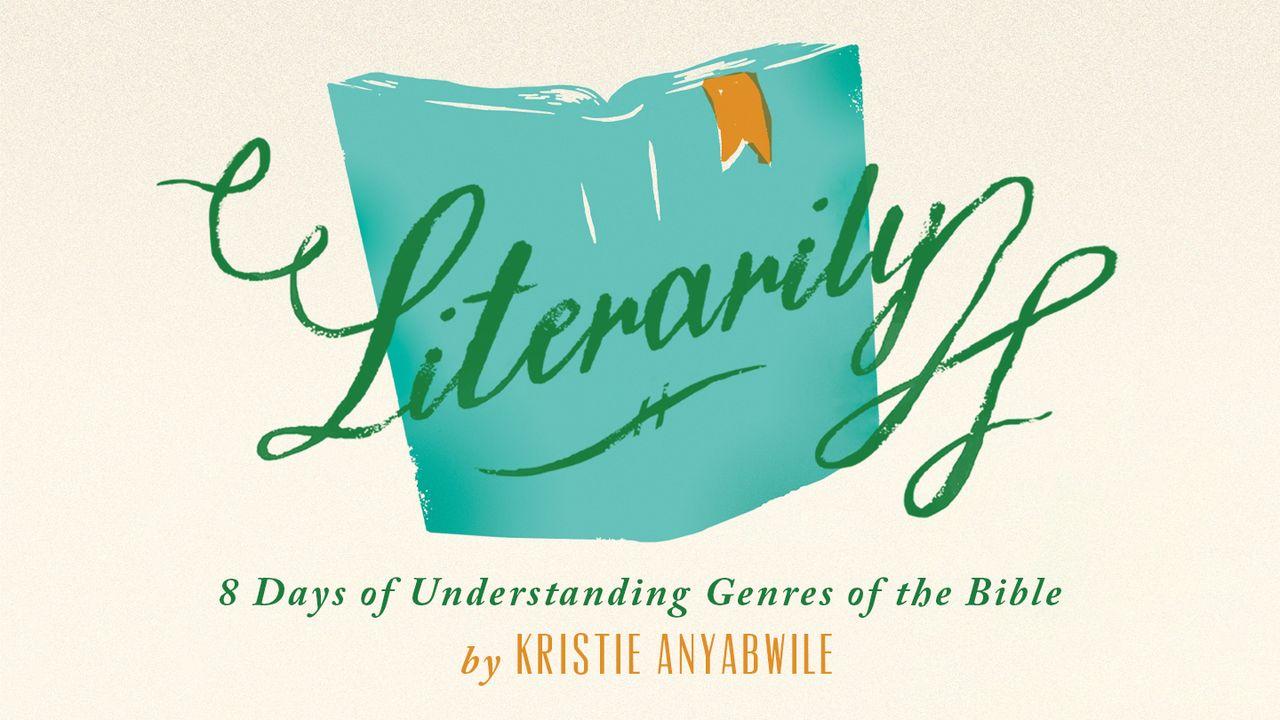Literarily: 8 Days of Understanding Genres of the Bible by Kristie AnyabwileExemplo

Poetry
Scripture - Psalm 3
Read today's passage of scripture before continuing to read this devotion.
What is being repeated, contrasted, explained, or expanded upon? Make note of any imagery throughout the psalm. Engage your senses and emotions in the reading of the psalm. How is the poem directing you to feel? What is it that you see through David’s eyes? What do you learn about God in this psalm? Given David’s response to his situation, what should our response be to ours?
The majority of poetic literature is found in the psalms, so it will be helpful to understand some key features often found in the psalms. First, the psalms are the praise songs, prayers, and liturgies (patterns for public worship) of the people of God. About half of them were written by David. We know this because they contain inscriptions that say, “A psalm of David,” sometimes adding a bit of description for the occasion in which he wrote it (see Psalms 34 or 52, for example). There are a handful of additional named authors of various psalms, and several with no authors named at all. The opening inscription also sometimes provides musical instructions for the choirmaster, or it indicates that the psalm is a prayer (Psalm 90) or a song of thanksgiving (Psalm 100).
Second, the psalms are organized into five books. Before each new book, the previous one ends with a verse that says something like “Blessed be the Lord” or “Blessed be the Lord, the God of Israel” (see Psalms 41:13; 72:18; 89:52; 106:48). Some believe that the five books correspond to the Pentateuch, providing memorable recitations that survey the history of Israel in a songbook of sorts, as they move from themes of sin and lament and judgment to redemption and thanksgiving and praise.
Third, the psalms can be categorized according to various literary types that help us understand its purpose. Psalms of lament (Psalms 3, 13, 69) call God’s people to acknowledge the sin and brokenness of the world and to pray in faith for deliverance. Wisdom psalms (Psalms 1, 37) provide direction and guidance for God’s people. Royal psalms (Psalms 21, 110) anticipate the messianic kingship of Christ. Praise psalms (Psalms 8, 150) center on God’s character and the rightful response of His worshipers. Imprecatory psalms (Psalms 7, 58) call on God to pour out judgment and justice on His and the people’s enemies. Thanksgiving psalms (Psalms 29, 136) offer gratitude to God for answered prayer, for His goodness, and for His abundant blessings. Additional categories are evident from the psalm itself, either in the inscription at the beginning or in the body of the psalm. It’s helpful to ask as you read the psalms, “What type of psalm am I reading, and what is it revealing to me about God?”
Escritura
Sobre este plano

In this eight-day study, you will learn about the major genres of Scripture - Law, Old Testament Narrative, Poetry, Wisdom, Prophecy, Gospels & Acts, Epistles, and Apocalyptic. We can deepen our understanding of God's Word by learning to study the Bible according to its literary genres. Whether you are new or seasoned in Bible study, this plan is intended to provide a framework for reading and understanding each genre.
More
Planos Relacionados

O Cuidado Da Mulher Com a Saúde Mental

Revisão De Vida

Superando O Luto Com Esperança E Cura

O Melhor De Deus Para Si

Ansiedade E a Busca Da Alma Por Descanso

Experimente O Cuidado De Deus

Lidando Com a Mudança Para a Glória De Deus

O Deus Dos Milagres

O Que Deus Promete, Ele Cumpre
